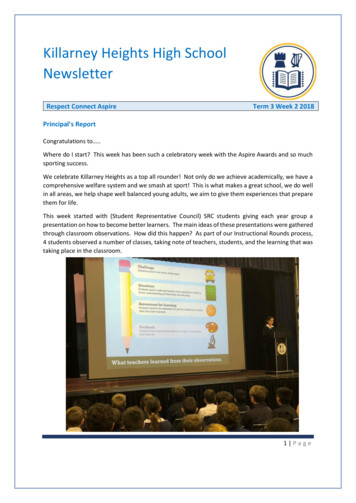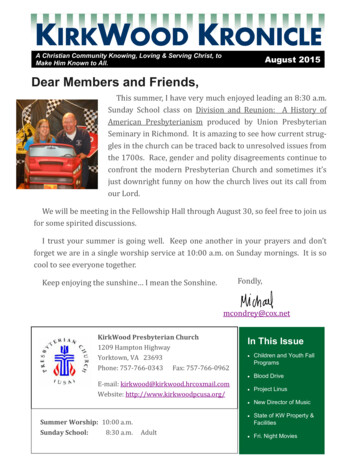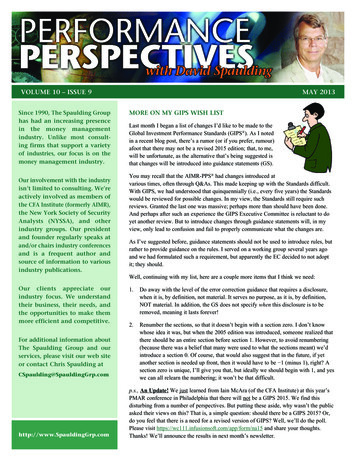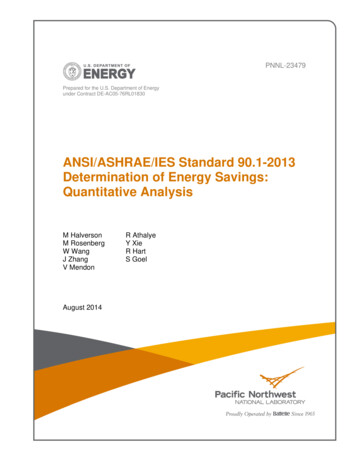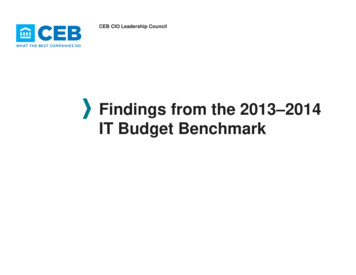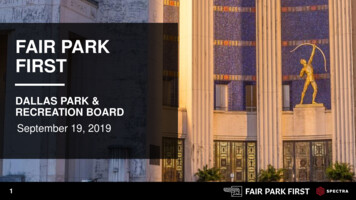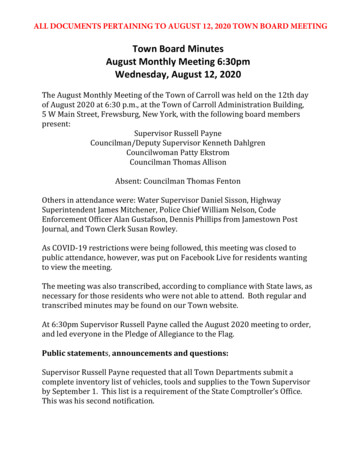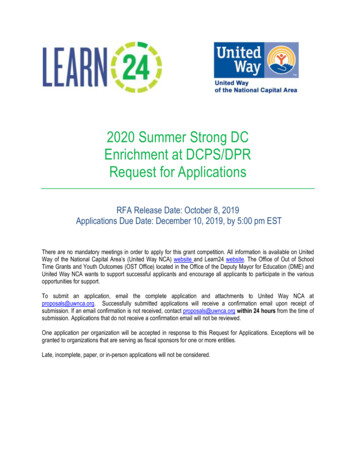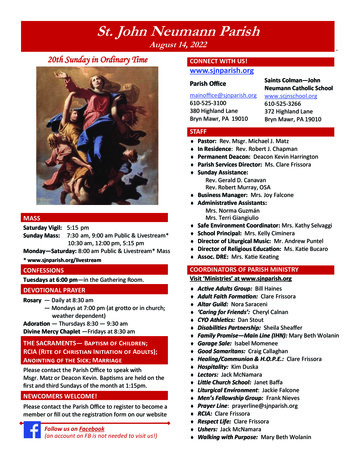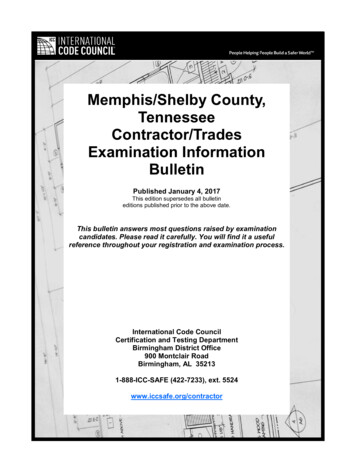
Transcription
RENDERED: AUGUST 29, 2013TO BE PUBLISHED,i5nprrittr C.:ourf ;'.firttfurttv2011-SC-000291-DGMILDRED ABBOTT, BARBARA ABEL, ELIZABETH ABNEY,LISA ABRAHAM, PAMELA ABRAMS, ELIZABETH ADAMS,CATHY ADAMS, PHYLLIS ADAMS, RUBY ADAMS, RUBYADAMSON, SUSAN ADKINS, CLANTHA AKERS, EFFIE ALSIP,JUANITA ALTON, JOANN ALVEY, PHYLLIS APPLEGATE, CINDYARMSTRONG, SUSAN ARVIN, CLARA ATKINSON, KARENAUSTIN, LINDA BACK, JAMIE BAILEY, MARY ANN BAILEY,VICKIE BAILEY, CHARLOTTE BAKER, CHARLOTTE BAKER, ONBEHALF OF THE ESTATE OF LANE WALKER, DAVID WALKER,ON BEHALF OF THE ESTATE OF LANE WALKER, JODYBALDRIDGE, CARLA BALDWIN, SARAH BALENOVICH, ONBEHALF OF THE ESTATE OF EDITH BROWNING, CAROLBARNES, ON BEHALF OF THE ESTATE OF DANNY ABNEY,MARILYN BARNES, LEE BARTLEY JR, TERESABAUMGARDNER, DEBRA BAYS-PLYBON, MELISSA FAYEBEAMON, LINDA BEGGS, PATRICIA BELCHER, LEISABELDING, ELEANOR BERRY, MARGIE BERRY, MARGARETBINGHAM, EASTER BISHOP, EMMA BLACK, JANICE BLAIR,SHARON BLAIR, CAROL BOGGS, LORI BOONE, JOIE BOTKINS,KATHY.BOWLING, ANGIE LYNN BOWMAN, VIRGINIA BRADEN,LADONNA BRAME, JAMES BRANHAM, KATHY BRANHAM,RUBY BRANHAM, BRENDA BRAY, NORMA BREWER, VICKIEBREWER, ALMA BROCK, GLENNA BROCK-POWELL, PEGGYBROUGHTON, BARBARA BROWN, JOYCE BROWN, KARENBROWN, SHARON BROWN, DEBORAH BROWNING, NATHANIELBRUMFIELD, ON BEHALF OF WATHALEE BRUMFIELD, BILLIEBRUMLEY, LINDA BRUMLEY, KIMBERLY BRummETT, TERESABRUNER, PATRICIA BRYANT, CHRISTINA BUCHER, LESLIEBULLOCK, JUDY BUNDY, WARREN BURGESS, JANICEBURTON, TINA BUSH, SHERRIE BUTLER, DONNA CAMPBELL,LORETTA CAMPBELL, BUEL CANTRELL, LINDA CARR, TONYACARTER, WALLACE CARTER, CHARLOTTE CASON, LISACAUDILL, CONNIE SUE CENTERS, TONY CHILDERS, GLORIACLARK, WILLIAM CLARK, ROSEMARY CLICK, PAMELA CLIFT,DANIELLE CLORE, ALLEN COKER, JUDY COLEMAN, SHIRLEYCOLEMAN, TARA COLEMAN, DEBRA COLLIER, MARGARETCOLLIER, OPAL COLLINS, LINDA COLVIN, PHYLLIS COMBS,CAROLYN CONLEY, JAMES COOK, RONNIE COOK, JANETCOONS- GREENE, GEORGIA COOTS, MARK CORNN, SANDRACOTTON GILLEY, NADINE COUCH, JOSEPH COWLEY, JO ANNAPPELLANTS.
COX, BARBARA CRAIN, DORIS CREECH, DELORIS CRISWELL,PAMELA CROWE, TRACY CURTIS, DORIS DABNEY, DARBYDANIELS, KATHY DANIELS-STEPHENSON, MARY DAUGHTERY,BETTY DAVIDSON, ON BEHALF OF THE ESTATE OF EVELYNJACKSON, GINGER DAVIDSON-GIBSON, ELIZABETH DAVIS,SANDRA DAVIS, KAREN DEAN, BOBBIE DEATON, JANDELANEY, REGINA DESPAIN, JUDY DILE, GERRY DIXON, ALDOSER, BELVA DOTSON, TERESA DUFF; LINDA DUNAWAY,YNETTA ECKERT, TAMI EDWARDS-ENGLE, MARTHA ELLIOT,SAUNDRA ERP, CHARLOTTE ESTEPP, SARAH ESTES, SUSANEZELL, ELIZABETH FANNIN, JANET FENTRESS, HAYWOODFERGUSON, ON BEHALF OF THE ESTATE OF ALMAFERGUSON, WILLIAM FITCH, ON BEHLAF OF THE ESTATE OFSHELIA FITCH, VICKIE FLANNERY, PAUL FLOYD, BERNITAFLYNN, RHONDA FLYNN OSBURN, BERENDA FORD, RHONDAFRANKLIN, TIMOTHY FRANKLIN, MARY FRAZIER, ESSIEFREDRICK, FREDA FRIZZELL, BEULAH FUGATE, CLARAFULKS, PATRICIA GAUNCE, BARBARA GAY, MELISSAGAYHEART, KEN GAYHEART, JAMES GIBSON, ON BEHALF OFTHE ESTATE OF JESSIE GIBSON, JONI GIBSON, TARAGIFFORD, GLADYS GILBERT, STEPHANIE GIST, RUBYGODBEY, EDDIE GOLDEN, DEBRA GOODE, JOYCE GORDON,PATRICK GRAHAM, TAMMY GRANT, AMY GRAY, DONNAGREEN, SHERRIE GREEN, PEGGY GRIGSBY, ALLIE HALL,GERALDINE HALL, NORMA HALL, SHANNON HALL, BARBARAHAMPTON, RHONDA HANCOCK, LEONA GAIL HANDLEY,JOYCE HANLEY, REBECCA HARRIS, DEBRA HARRISON,DIANE HARRISON, JOYCE HASSLER, YOLANDA HAYDEN,BARBARA HEIZER, BARBARA HELLMUELLER, REVA HELTON,WANDA HELTON, BONNIE HENDERSON, GARYHENDRICKSON, VIKKI HENLEY, VICKIE HENRY, MARCUSHIGHLEY, CHARLENE HILL, KAREN HILLARD, JANICE HILTON,LINDA HINKLE, JACQUELINE HOCKER, GWEN HOLT, TAMIHOLT, MYRA HOOD, VICKIE HOOD, LORA HOOVER, EVELYNHOPKINS, CHARLENE HORN, MARY HORNING, CLOYDHOSKINS, LINDA HOSKINS, MARILYN HOWARD, MARYHOWARD, TOLORIA HOWARD, DONNA HOWSER, CHARLOTTEHUGHES, MARCIA HUGHES, MARGIE HULSE, SHEILAHUMPREYS, MARGARET HUNT, WANDA HUNTER, BRENDAHUTCHCRAFT, LORENE HUTCHERSON, KATHERINEHUTCHINSON, JAMES INGRAM, EMMA ISON, DELLAJACKSON, KATINA JACKSON, MARY JACKSON, LINDA JAMES,LYNN JEFCOAT, DEBBIE JEFFREY, GARNETT JOHNSON,ERNESTINE LESLIE JOHNSTONE, BEULAH JONES, FRANKLINJONES, GERRY JONES, JUDY JONES, KATHY JONES, LINDAJONES, MARLENE JONES, ON BEHALF OF THE ESTATE OFLORETTA EDMOND, STEWART JONES, TROY JONES, BETTYJORDON, BETTY KELLEY, APRIL KELTNER NUXOLL, GERALDKING, KATHERINE KING, PATTIE KITTS, BETTY KLUCK,LUCILLE KREY, BILL LADY, ON BEHALF OF THE ESTATE OF2
MARY LADY, LINDA LARKINS, ANGELA LEWIS-MULLINNIX,EMILY LEWIS, BEVERLY LITTLE, SANDRA DEE LITTLETON,LOIS LOCKARD, ON BEHALF OF THE ESTATE OF LLOYDLOCKARD, LINDA LONG, SHERRY LONG, KATHY LOVAN-DAY,NONA LUCAS, CHARLOTTE LUSH, LINDA MALONE MCGOWAN,PAULA MANN, PAMELA MARLOWE, ARLENE MARSHALL,BOBBIE MARTIN, LINDA MARTIN, MARY MARTIN, CONNIEMASON, JONI MCCLANAHAN, LAVONNA MCDANIEL, CONNIEMCGIRR, ROBERTA MCGUIRE, TAMMY MCGUIRE,JACQUELYN MCMURTRY, JUNE MCPHEARSON, SHEILA LYNNMEECE, THELMA MERIDA, ANDREA MESSAMORE, WANDAMETZGER, DELORIS MILLER, LINDA MILLER, LINDA L.MILLER, MARIE MILLER, NELLIE MILLER, ORENE SALYERMILLER, BELINDA MILLION, LESLIE MINTON, WILLIAMMIRACLE, ON BEHALF OF THE ESTATE OF KATHY MIRACLE,BEVERLY MITCHELL, EUDORA MONTGOMERY, ELLA MOORE,ON BEHALF OF THE ESTATE OF JONNETTA MOORE,MARGARET MOORE, RHONDA MOORE, APRIL MORRIS,LOUISA MOSS, DONNA MUDDIMAN-CORNISH, AILEENMULLINS, MARY NAPIER, WANDA FAYE NEACE, ELIZABETHNEAL, LINDA NEVELS, DIANA NEWLIN, WILMA NOE, KATHYNOLAN, SHELIA NOLAN, GLENORA PACE, BERTHA PACK,RAYMOND PARKER, LOUVERNA PARKS, MYRTLE PARRIS,JESSIE PARSONS, ANGELA PEACE, JUDITH PECK WAGEMAN,LISA PEEK, RECIE PENNINGTON, HELEN PERKINS, JEFFPERKINS, JOE ANN PERKINS SPENCER, STACY PERKINS, JOYPERRY, ON BEHALF OF THE ESTATE OF MILTON LEWIS,DORIS PHELPS, NORMA PICKETT, SONJA PICKETT, KATHYPOLLITTE, BRIAN POWELL, MARY P'POOL, TRENA PRESTON,SUZANNE PRICE, RITA PROFITT-NORMAN, LYNNE PURSEL,SHARON RAINWATER, BILLIE REESE, BRENDA RENTAS, ONBEHALF OF THE ESTATE OF ANTHONY RENTAS, ARLIERHODES, EVELYN RHODES, RAYMOND RILEY, LEVETTARIVIERA, ODENA ROADEN, BILLIE JUNE ROBERTS, DYANROBERTS, PATRICIA ROBERTS', RENEE ROBERTS, PATRICIAROBINSON, FETINA ROBINSON, CAROL ROGERS, CATHYROSE, VINA ROSE, LARRY ROSEBERRY JR, ON BEHALF OFTHE ESTATE OF LARRY ROSEBERRY, SR., BOBBY SALLEE,MARY SAMS, KATHY SANDS, JUSTUS SCHAROLD, CRYSTALSEALS-GIBSON, MAXINE SEALS, CLAUDIA SEBASTIANSHEPARD, LISA SEXTON, MONICA SEXTON, TERRY SHANKS,MARGARET SHARON, MICHELLE SHARPE ROBERTS, DEBRASHEPHERD, JANET SHORT, LINDA CAUDILL, ON BEHALF OFTHE ESTATE OF LAUREDA SHORT, MONICA SHUFFETT,LORETTA SIDWELL, ADA SIZEMORE, APRIL SLNITEN-JONES,CAROLE SLONE, BARBARA SMITH, ELAINE SMITH, FREDASMITH, WESLEY SMITH, ON BEHALF OF THE ESTATE OFSHARON SMITH, PEGGY SPEARS, CORINA STEARNS, CORASTAPLETON, DEBBIE STATON, PAUL STAUFFER, CONNIESTEPHENS, NANCY STEPHENS, SHARON STEVENSON,3
MARLENE STEWART, BETTY STONE, DONNA STROMOWSKY,CONNIE STURGILL, SHIRLEY SUDDUTH, ON BEHALF OF THEESTATE OF MARJORIE SUDDUTH, PAM SULLIVAN, ONBEHALF OF THE ESTATE OF REBECCA LOVELL, SHARONSTEPHENS, ON BEHALF OF THE ESTATE OF REBECCALOVELL, MILDRED SWANSON, LISA SWIGER, ELLA TACKETT,PATTY TACKETT, PRISCILLA TAFOLLA, CHARLES TAPLEY,ELLA TAYLOR, LINDA TAYLOR, JEANNE THOMAS, ELIZABETHTHOMPSON-WASHBURN, KAREN THOMPSON MCCLAIN,NANCY THOMPSON, JAMES G. THURMAN, LISA GRANTTHURMAN, STEVE TOLLER, ON BEHALF OF THE ESTATE OFLINDA TOLER, ROY TOYLER, ELIZABETH TRENT, JENNYTRIMBLE, JOETTA TUCKER, DEBORAH TURNER, DRUCILLATURNER, MARIE TURNER, PATRICIA TURNER, VALORIETURNER, LINDA VANCE, LINDA VANARSDALL-COLLINS,DEBBIE VOGT SCHNEIDER, BOBBIE WALKER, LORENEWALLEN, CINDY WALTERS, BETTY WARD, ON BEHALF OF THEESTATE OF MARTIN WARD, WANDA WATKINS, CHERYLWATSON, IRENE WELLS, JOYCE GOFF WELLS, JUDYWHITAKER, KIM WHITE, MARY WHITE, PATRICIA WHITE,CATHERINE WHITLOCK, JOYCE WHITT, BETTY WIDENER,PETER WILDS, CAROL QUISENBERRY WILLIAMS, TODDWILLIAMS, ON BEHALF OF THE ESTATE OF GLORIAWILLIAMS, BETHANY WILLINGER, GENEVA WILSON, ROBERTWILSON, MELODY WINER, CONNIE WOLFE, BILL WOMBLES,AMANDA EDWARDS WOOD, ARTIE WOODS, FERN WOOTEN,DEBORAH WRIGHT, EDWINA WRIGHT, ROGER WRIGHT,SANDRA WRIGHT, TAMMY WRIGHT, DOYLE YANCY, SHEILAYATES, KAREN YOUNG, SANDRA ZEHMANV.ON REVIEW FROM COURT OF APPEALSCASE NOS. 2007-CA-001971-MR, 2007-CA-001981-MR,2007-CA-002173-MR AND 2007-CA-002174-MRBOONE CIRCUIT COURT NO. 05-CI-00436STANLEY M. CHESLEY, SHIRLEY A.CUNNINGHAM, JR., WILLIAM J. GALLION, ANDMELBOURNE MILLS, JR.OPINION OF THE COURT BY JUSTICE VENTERSAFFIRMING IN PART AND REVERSING IN PART4APPELLEES
This case arose in the aftermath of the settlement of Darla S. Guard, etal. v. American Home Products, Inc. (Guard). 1 The Guard case, which is alsoknown as "Jonetta Moore, et al. v. American Home Products, Inc.," or the "Moore"case, was brought by Kentucky residents who had taken the popular diet drugknown as Fen-Phen. Each Appellant/Cross-Appellee (collectively "Appellants")was a plaintiff in the Guard case and was represented under a contingent feecontract by Appellees/ Cross-Appellants (collectively "Appellees") 2 Shirley A.Cunningham, William J. Gallion, or Melbourne Mills, Jr. Appellee Stanley M.Chesley later joined the plaintiffs' team of attorneys. Appellants' complaintalleges that Appellees breached their fiduciary duties by wrongfully retaining orby improperly disbursing a substantial portion of the Guard case settlementmoney that should have gone to Appellants.The trial court granted Appellants a partial summary judgment on theclaim that Cunningham, Gallion, and Mills ("CGM") 3 breached their fiduciaryduty. The trial court concluded that genuine issues of material fact existed inconnection with Chesley's role, and so the motion for summary judgmentagainst him was denied. The Court of Appeals reversed the partial summaryjudgment against CGM and remanded the case against them for further1Boone Circuit Court Civil Action No. 98-CI-795.2In this opinion," Appellees" refers to all Appellees, i.e. Cunningham, Gallion, Mills, andChesley.3 Some of the alleged wrongful conduct relates in common to Cunningham, Gallion, andMills, but not to Chesley. Therefore, upon occasion as appropriate, we refer to Cunningham,Gallion, and Mills collectively as "CGM." Otherwise, we refer to each Appellee individually.References to CGM do not include Chesley.5
proceedings. It declined Appellants' request for review of the trial court's denialof summary judgment against Chesley.On discretionary review, we now address the following issues:1) Whether the Court of Appeals erred in reversing the partial summaryjudgment entered against CGM;2) Whether the Court of Appeals erred by declining to review the trialcourt's denial of summary judgment against Chesley;3) Whether the trial court could impose upon CGM joint and severalliability for the damages sustained by Appellants;4) Whether the Court of Appeals erred in affirming the trial court'sdecision refusing to transfer the case from the Boone Circuit Court to theFayette Circuit Court; and,5) Whether the trial court erred in crediting the monetary judgmentagainst CGM with undocumented expenses that Mills claimed heincurred in the Guard case.For the reasons set forth below, we reverse the Court of Appeals' opinionupon the issue of CGM's breach of fiduciary duty and reinstate the partialsummary judgment entered against CGM by the trial court. We also concludethat the imposition of joint and several liability against CGM was proper, andso we likewise reverse that aspect of the Court of Appeals' opinion. In addition,we affirm the Court of Appeals' conclusion that the denial of summaryjudgment against Chesley was not an appealable issue; we affirm the Court ofAppeals' determination that the Boone Circuit Court properly refused to6
transfer the case to the Fayette Circuit Court; and we agree with Appellantsthat the trial court erred by crediting CGM with the undocumented expensesclaimed by Mills.I. FACTUAL AND PROCEDURAL BACKGROUNDAfter discovery in the mid-1990s that the popular weight-loss drugcombination of fenfluramine and phentermine known as Fen-Phen was linkedto heart damage and other dangerous side-effects, Fen-Phen was taken off themarket. American Home Products (American Home), the manufacturer of FenPhen soon faced several lawsuits by Fen-Phen users. Appellees Cunningham,Gallion, and Mills were Kentucky attorneys with separate law practices.However, they pooled their talents and resources into a collective effort torepresent some 431 individual plaintiffs, all of whom were Kentucky residentswho had taken Fen-Phen. Each of the 431 plaintiffs had signed a contingentfee contract with Cunningham, Gallion, or Mills. Cunningham's clients hadagreed to a contingent fee of "33 1 / 3% of the total sum recovered, whether bysettlement or by trial . . ." plus reimbursement for expenses "directly incurredin investigating or litigating this claim . . . ." Gallion's contingent fee agreementprovided for "33% of the total sum recovered, whether by settlement or by trial. . ." plus expenses "incurred in investigating or litigating this claim[.]" Mills'scontingent fee agreement provided that "Attorney's fees shall be set by thecourt, but shall not be more than 30% of the client's net recovery." Expenseswere to be "repaid [to the attorney] off the top before calculation of fee."7
In the early stages of the litigation, Appellees had the case certified bythe Boone Circuit Court as a class action. Chesley had only a few Fen-Phenclients, but he had experience in the settlement of Fen-Phen proceedings,having served on the management committee of the national Fen-Phen classaction litigation. Because of Chesley's experience and national reputation,CGM agreed to his participation in the Guard case. Chesley, Gallion,Cunningham, Mills, and an attorney from Cincinnati named Richard Lawrencewho also represented a few individual Fen-Phen claimants, entered into awritten agreement outlining the role each attorney was to perform in thelitigation and agreeing upon a method of sharing the fees earned in the case.Gallion would serve as lead trial counsel in the event the case was tried, andwould prepare the case accordingly. Cunningham and Mills would enrollclients and maintain client contact information. Chesley would act as "leadnegotiator" in the effort to secure a collective settlement of the claims.The written agreement provided that if a negotiated settlement wasachieved, Chesley would take a 21%-share of the combined attorneys' fee; CGMwould split 74% of the total fee among themselves and their associates; andRichard Lawrence, who is not a party to this case, would take 5%. If anegotiated settlement was not achieved, the lawyers agreed that Chesley wouldget 15% of the fees generated by a verdict and CGM would share 80%, withLawrence receiving the remaining 5%. The agreement also provided that "allparties to this agreement shall have the right to review all contracts betweenthemselves and any other parties that may affect the fees earned and all clients8
shall be advised of this agreement." The agreement further provided that "allparties to this agreement shall be identified as co-counsel in the class actionstyled Guard v. American Home Products in Boone Circuit Court in Kentucky."Appellants however were not made aware of this agreement among theattorneys.Eventually, American Home agreed to pay an aggregate sum of 200million to settle the claims of all of the Guard case claimants. The settlementagreement provided that Appellees would obtain, in the Boone Circuit Court,the decertification of the Guard class action and the dismissal of all theindividual claims. The settlement fund, less 7.5 million to be reserved forpossible future claimants, was allocated among the 431 clients with whomCGM had fee contracts. The claims of 143 other individuals, who had joinedthe class action but had not personally retained any of Appellees, weredismissed without prejudice with the expectation that those individuals couldelect to join the national settlement. American Home left it to CGM todetermine how much of the fund would be allocated to each client. However,the settlement agreement required Appellees to provide a scheduled accountingfor the amount allocated to each individual claimant.Contrary to the terms of the settlement agreement, none of theAppellants were informed of the terms of the settlement. Nor were they toldthat a settlement fund of 200 million was established. They were also not toldthat their attorneys were determining how to apportion the settlement fund.Instead, each Appellant was falsely told that American Home had made a9
specific, individualized offer to settle his or her claim. After the Boone CircuitCourt decertified the class action, Appellees distributed to Appellants 73,296,864.96 with no order of approval from the court. They alsoestablished a non-profit organization named Kentucky Fund for Healthy Living(KFHL) to which they diverted 20 million. The balance of the money, some 106 million, they divided among themselves pursuant to their writtenagreement.It was eventually discovered that the attorneys' fees retained by Appelleesfar exceeded the 30% to 33.33% allowable under the contingent feeagreements. Appellants filed suit in the Fayette Circuit Court demanding anaccounting of the Guard case settlement money, the disgorgement ofmisappropriated funds traced to the Guard case settlement, and judgmentagainst Appellees for money they paid themselves in excess of the contingentfee contracts.Upon motion of Appellees, the Fayette Circuit Court determined that theBoone Circuit Court was the proper venue for the action. Over Appellants'objection, the case was transferred to the Boone Circuit Court. More than twoyears after the case was transferred to the Boone Circuit Court, and afterseveral volumes of pleadings had been filed there, Appellants moved that courtto transfer the case back to the Fayette Circuit Court. Appellants argued thatthe Boone Circuit Court was an improper venue, that the Fayette Circuit Courtwas the only proper venue, and that Fayette County provided a moreconvenient forum for the parties. The Boone Circuit Court denied the motion.10
In due course, Appellants moved for partial summary judgment. Thetrial court first concluded as a matter of law that, by violating their contingentfee agreements with their clients, Cunningham, Gallion, and Mills hadbreached their fiduciary duty to Appellants. It granted Appellants a partialsummary judgment on that issue.Later, and after additional proceedings, the trial court granted Appellantssummary judgment on the issue of compensatory damages for the breach offiduciary duty. Based upon what it described as "uncontroverted facts," thetrial court concluded that Appellees paid themselves and others a total of 126,793,551.22 from the Guard case settlement while the contingent feecontracts limited their fees to a maximum of 60,798,783.14. 4 The trial courtalso concluded that Appellees were entitled to a credit of 1.5 million forundocumented and previously undisclosed expenses Mills claimed he incurredin the Fen-Phen litigation. The trial court then did the math to ascertain thatAppellees wrongfully withheld from Appellants a total of 64,280,497.00.Rounding off the figures to Appellees' advantage, and subtracting the 20.5million used to fund the KFHL, the trial court awarded Appellants judgmentagainst Cunningham, Gallion and Mills in the sum of 42 million, plus interestat 8%.The trial court also held that Cunningham, Gallion, and Mills werejointly and severally liable to Appellants. It further determined that AppellantsBased on a collaborative agreement between the attorneys, Chesley was entitled to 12,767,744.45 and CGM were collectively entitled to 44,991,099.52.411
were entitled to a judgment imposing a constructive trust upon the fundsremaining with KFHL.The trial court reserved for trial the issues of Appellees' liability on theAppellants' claims concerning negligent or fraudulent misrepresentation,punitive damages, and whether Appellees should be denied the right to claimany fee. Significantly, the facts surrounding Chesley's professional relationshipwith Appellants differed from the facts that defined CGM's relationship with theclients. As a consequence, the trial court found that genuine issues of factremained regarding Chesley's liability, and so it denied Appellants' motion forsummary judgment against him. 5On appeal to the Court of Appeals, CGM challenged the entry ofsummary judgment on the breach of fiduciary duty claim and the assessmentof joint and several liability. Appellants cross-appealed the trial court's denialof their motion to transfer venue, the denial of summary judgment againstChesley, and the deduction of Mills's purported expenses from thecompensatory award.The Court of Appeals reversed the trial court's award of summaryjudgment on the Appellants' breach of fiduciary duty claim upon its conclusion5 The mishandling of the Guard case settlement fund resulted in several attorneydisciplinary actions. Cunningham, Gallion, Mills, and Chesley were permanently disbarredfrom the practice of law in the Commonwealth. See Cunningham v. Kentucky Bar Ass'n, 266S.W.3d 808 (Ky. 2008); Gallion v. Kentucky Bar Ass'n, 266 S.W.3d 802 (Ky. 2008); KentuckyBar Ass'n v. Mills, 318 S.W.3d 89 (Ky. 2010); and Kentucky Bar Ass'n v. Chesley, 393 S.W.3d584 (Ky. 2013). An associate of Gallion and the judge who presided over the Guard action werealso disbarred due to their conduct relating to the case. See Kentucky Bar Ass'n v. Helmers,353 S.W.3d 599 (Ky. 2011) and Kentucky BarAss'n v. Bamberger, 354 S.W.3d 576 (Ky. 2011).12
that genuine issues of material fact remained unresolved. 6 The Court ofAppeals concluded that the order denying summary judgment against Chesleywas not appealable, and therefore declined to review it. The Court of Appealsaffirmed the trial court's ruling on the venue issue; it did not rule on the issuesof Mills's claimed expenses and joint and several liability because the reversalof the summary judgment rendered those issues moot. Upon Appellants'motion, we granted discretionary review.II. APPELLANTS WERE ENTITLED TO SUMMARY JUDGMENT AGAINSTCUNNINGHAM, GALLION, AND MILLS ON THE ISSUE OF LIABILITYThe trial court entered partial summary judgment, adjudicating thatCunningham, Gallion, and Mills had breached their fiduciary duty toAppellants by taking a portion of the Fen-Phen settlement fund that greatlyexceeded the attorneys' fees agreed upon in Appellants' individual contingencycontracts, thereby reducing the net recovery available to each Appellant. TheCourt of Appeals set aside the summary judgment because it concluded thatKenneth Feinberg's affidavit raised a genuine issue of fact material to thebreach of fiduciary duty issue. Feinberg is a nationally recognized authority onthe settlement of mass tort litigation. He opined that the attorneys' fees takenby CGM and the diversion of 20 million to KFHL was "not out of the ordinary"for a "class action or common fund or aggregate mass tort settlement," and6 The Court of Appeals identified the following material issues of fact: 1. Whether thesettlement was to be split in its entirety among the 431 settling plaintiffs; 2. Whether theAppellees were obligated to indemnify American Home Products; 3. Whether the plaintiffs werefairly and adequately compensated; and 4. Whether the plaintiffs were entitled to the moneyused to fund the Kentucky Fund for Healthy Living.13
that the client fee contracts did not control CGM's proper share of thesettlement fund. Appellants contend that Feinberg's affidavit is merely hisopinion on an issue of law and controverts none of the essential facts uponwhich Appellants' claims are based.We agree that Feinberg's comments have no impact on the propriety ofthe summary judgment because they shed no light whatsoever on any materialissue of fact. At most, Feinberg's affidavit suggested that the manner in whichCGM apportioned the settlement fund among themselves and their clients wascommon and, perhaps, not unreasonable. But because the pertinent facts areotherwise not in dispute, the question of whether their conduct amounted to abreach of fiduciary duty is a question of law for the trial court to decide. It isnot an issue of fact to be resolved at trial. Our review of the record convincesus that, under the particular circumstances of this case, the Feinberg affidavitdid not generate a genuine issue of material fact.Our review of the record discloses no genuine issue of fact regarding theconduct that Appellants claimed to be a breach of CGM's fiduciary duty tothem. As the trial court aptly observed, "one need go no further than ananalysis of two exhibits to conclude that [CGM] breach[ed] their fiduciary dutyto [Appellants] in the underlying case." The two exhibits are the fee contractsand a schedule showing the receipts and disbursements of the settlement fund.The veracity of those exhibits was not challenged and the facts they establishedwere not disputed. It was also undisputed that Appellants did not agree to anymodifications of their fee agreements and that they received no notice of CGM's14
fee disbursements. The trial court calculated from these uncontroverted factsthat the contingent fee contracts allowed Appellees to be paid attorneys' fees of 60,798,783.14. The trial court determined from what it referred to as "simplearithmetic" that the lawyers distributed to themselves and to KFHL 126,793,551.22. After rounding-off the numbers to Appellees' advantage andgiving them credit for 1.5 million in undocumented expenses claimed by Mills,the trial court determined that Appellees were indebted to Appellantscollectively in the sum of 42 million.Thus, the only question for the trial court was whether those factsestablished a breach of fiduciary duty that entitled Appellants to summaryjudgment on CGM's liability as a matter of law. We conclude that they did, andso we reverse the Court of Appeals upon the breach of fiduciary duty issue.As was noted in Daugherty v. Runner, the attorney-client relationship isat once both contractual and fiduciary:The relationship of attorney-client is a contractual one, either expressedor implied by the conduct of the parties. The relationship is generallythat of principal and agent; however, the attorney is vested with powerssuperior to those of any ordinary agent because of the attorney's quasijudicial status as an officer of the court; thus the attorney is responsiblefor the administration of justice in the public interest, a higher duty thanany ordinary agent owes his principal. Since the relationship ofattorney-client is one fiduciary in nature, the attorney has the duty toexercise in all his relationships with this client-principal the mostscrupulous honor, good faith and fidelity to his client's interest.581 S.W.2d 12, 16 (Ky. App. 1978). The attorney-client relationship is afiduciary relationship that subjects the attorney to the duties, of honesty,loyalty, and good faith. See Clark v. Burden, 917 S.W.2d 574, 575 (Ky. 1996)15
(quoting Daugherty, 581 S.W.2d at 16). Indeed, a fiduciary duty is "the highestorder of duty imposed by law." In re Sallee, 286 F.3d 878, 891 (6th Cir. 2002).The intertwining of an attorney's contractual duty to the client andhis/her fiduciary duty to the client is even more pronounced in this casebecause the fiduciary duty Appellees allegedly breached was the concomitantcontractual duty to charge a fee in accordance with the attorney-client feeagreements. Indeed, it might reasonably be said that the most elementaryaspect of an attorney's fiduciary duty of honesty and loyalty to his client wouldbe to honor the fee contract by taking no fees in excess of the authorizedcontractual amount and ensuring that the client receives his agreed-uponshare of the settlement.Appellees do not reasonably dispute the amount of fees they took or theamount the contingency fee contracts provided. They argue only that thosefacts are not material because the consolidation of Appellants' cases into aclass action relieved them from the limitations of the fee contracts and allowedthem to take whatever fee the trial court in the Guard case deemed"reasonable" attorneys' fees. Their argument, however, ignores the undisputedfacts that, pursuant to the settlement agreement with American Home, theclass action was decertified, the claim of each individual Appellant was settledfrom the fund established by American Home as if there had been no classaction, and the trial judge who allowed the exorbitant fees was disbarred for hiscollusion in the fraudulent class-action fee scheme.16
The trial court correctly perceived that, as a matter of law, CGM wereobligated, contractually and as fiduciaries, to honor the attorney-client feeagreements. Appellants never released them from the obligations of the feecontracts, and without the clients' consent they could not enfold the cases intoa class action, secure a lucrative fee with the help of a collusive trial judge, andthen decertify the class to remove the possibility that additional claimants mayappear and demand a share. The contingency fee agreements between CGMand Appellants were valid contracts that governed the portion of the settlementfund that could be properly paid to CGM. It is beyond rational dispute thatCGM breached their fee agreements with Appellants by claiming excessive feesand, in doing so, that CGM failed to ensure that each Appellant received his orher contractual share of the settlement.Additionally, Mills contends that he did not breach the contingency feeagreements with his 311 clients because the fees he personally received did notexceed 30% of the collective settlement obtained for his clients. Whether trueor not, that assertion does not create a material fact that could overcome amotion for summary judgment because it remains undisputed that Mills didnot protect his individual clients by ensuring that they received the 70% oftheir compensatory award as promised b
MARY LADY, LINDA LARKINS, ANGELA LEWIS-MULLINNIX, EMILY LEWIS, BEVERLY LITTLE, SANDRA DEE LITTLETON, . SHARON SMITH, PEGGY SPEARS, CORINA STEARNS, CORA STAPLETON, DEBBIE STATON, PAUL STAUFFER, CONNIE STEPHENS, NANCY STEPHENS, SHARON STEVENSON, 3 . . contingent fee agreement provided that "Attorney's fees shall be set by the . 29 . 30 .
